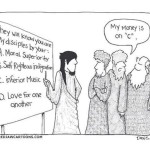We run our website the way we wished the whole internet worked: we provide high quality original content with no ads. We are funded solely by your direct support. Please consider supporting this project.

The Sine Qua Non of the Kingdom
In contrast to the habit of judgment which I challenged in the previous post, God calls his people to love the way that God loves. But what exactly does this mean? People have a lot of screwy ideas about “love” today. We use the word “love” to mean a lot of different things, from sexual intercourse (“making love”) to affection for objects (“I love my iPhone”) to friendship (“I love my friends at the bar”) to personal affirmations (“I love your new hair style”).
Thankfully, the Bible removes all ambiguity surrounding the word “love” by pointing us to the cross. “This is how we know what love is,” John says, “Jesus Christ laid down his life for us. And we ought to lay down our lives for one another” (1 John 3:16). This is the kind of love that defines God’s eternal nature, and this is the kind of love we are empowered to express to all others when we become his children.
In fact, manifesting Calvary-like love is the defining mark of a child of God, which is why Jesus taught us to love even our enemies “that you may be children of your Father in heaven.” Our Father loves indiscriminately – like the rain falls and the sun shines – and we make it clear that we are “born from above” when we manifest this love (Matt 5:44-45).
Along the same lines, manifesting indiscriminating love is the most basic distinguishing mark of the kingdom of God. We enthrone Christ as King of our life when we agree with him that each and every person was worth him dying for and that each and every person therefore has unsurpassable worth, totally apart from any assessment of their moral character. This is precisely why a kingdom person must follow Jesus example to the point where they are willing to be killed at the hands of threatening enemies rather than judging them to be unworthy of life by killing them in self-defense.
This radical Calvary-like love seems foolish, if not immoral, to the world, which shouldn’t surprise us since this is how the message of the cross strikes the world (I Cor 1:18, 24). And yet, manifesting this kind of love is the sina qua non of the kingdom. According to Paul, it is impossible for any activity, however impressive, to have any kingdom value if it lacks this kind of love. You can speak in tongues, give prophecies, have incredible insights into God’s greatest mysteries, possess all knowledge, manifest miracle-working power, and even appear to make great sacrifices for others, but if these things are not motivated by Calvary-like love, Paul says they are altogether worthless. The only thing that matters, Paul adds, is “faith expressing itself through love” (I Cor 13:1-3).
To the degree that the cruciform God reigns in an individual or a church, they will look cruciform. They will be expressing the unsurpassable worth of all others by sacrificing on their behalf – even when these others are threatening enemies. They will, in short, love others in the same self-sacrificial way Jesus loved them.
Photo via VisualHunt.com
Category: General
Tags: Cross, Judgment, Love
Topics: Following Jesus
Related Reading

Sermon Clip: The Worst of Sinners
In this short clip, Greg Boyd discusses Paul’s definition of love. In the full sermon, Greg talks about how in this dog eat dog world, we’re programmed to judge others. But to love others with unsurpassable worth, we must ascribe worth to them at cost to ourselves. In this sermon, Greg talks about how to…

Trinity and Love
Steve via Compfight There is a lot of mystery around the concept of the Trinity, and because the word is not used in Scripture some people think it’s not “Biblical”. David D. Flowers posted a very clear and concise article on the history and reality of the Trinity. This is a really helpful and quick…

Confronting Divine Determinism
Part of the fallen human condition inclines us to shirk our moral responsibility and accept that everything is predetermined, whether by God, the gods, fate, or blind chance. Various forms of determinism have been prevalent in most primitive religions, in much ancient philosophy, in most forms of Islam and even, most surprisingly, in much traditional…

The Cross as a Trinitarian Event
On Calvary, the all-holy God fully identified with sinners, suffering the consequences of our sin as though he himself were guilty. While God is never culpable for the evil he allows, he nevertheless assumes responsibility for it by fully identifying with those free agents who are in fact culpable. While the Son alone suffered as…

God’s Church is Not “Pretty”
This week we’ve been looking at various aspects of what it means to be the church. Today, I want to address the paradox of how the church can be both beautiful and ugly at the same time. Jesus came into our fractured world to manifest the beauty of God’s reign and revolt against the evil…

